Okay, so I stumbled upon something pretty cool the other day and just had to share. We all know donkeys – hardworking animals, often overlooked. But in rural Kenya, things are shifting, and tech is playing a starring role!
I was reading an article from TechCabal about a new initiative where donkeys are being microchipped, insured, and generally given a whole lot more protection. Seriously, who knew donkeys could be insured? It’s a big deal because, let’s be honest, donkeys are often seen as beasts of burden and treated accordingly. This project is trying to change that mindset, and I’m totally here for it.
Think about it: donkeys are vital for transporting goods, water, and even people in many rural communities. When they’re healthy and well-cared for, the entire community benefits. Studies have shown that animal welfare directly impacts the economic stability of households that rely on them. One study by Brooke, an international animal welfare organization, found that investing in working animal health leads to significant improvements in household income and food security. Brooke USA
The microchipping helps with identification and tracking, making it easier to prevent theft and ensure the donkeys receive proper care. Insurance provides a safety net for owners, so they can afford veterinary treatment when their donkeys get sick or injured. It’s a win-win.
This initiative isn’t just about the donkeys; it’s about empowering communities. It’s about recognizing the value of these animals and giving them the respect they deserve. It’s about using technology to improve lives – both human and animal. It’s estimated that working animals contribute up to 20% of household income in some developing countries. FAO – Food and Agriculture Organization of the United Nations That’s a significant chunk!
I’m always excited to see technology used in innovative ways to address real-world problems. And this donkey initiative in Kenya is a perfect example. It’s a reminder that even the smallest creatures can benefit from a little bit of tech and a whole lot of compassion.
Five Takeaways:
- Tech for Good: Microchipping and insurance are practical tech solutions improving animal welfare.
- Economic Impact: Healthy donkeys contribute to household income and community stability.
- Shifting Attitudes: This initiative is changing how donkeys are viewed and treated.
- Community Empowerment: Protecting donkeys empowers the communities that rely on them.
- Innovation in Action: It’s inspiring to see tech used creatively to address real-world problems.
FAQs: Donkey Welfare in Rural Kenya
- Why are donkeys important in rural Kenya? Donkeys are crucial for transportation, carrying goods, water, and people, especially in areas with limited infrastructure.
- How does microchipping help donkeys? Microchipping helps identify individual donkeys, prevent theft, and ensure they receive proper veterinary care.
- What kind of insurance is available for donkeys? The insurance covers veterinary treatment costs when donkeys are sick or injured, providing a safety net for owners.
- Who benefits from this donkey welfare initiative? The donkeys, their owners, and the entire rural community benefit from improved animal welfare and economic stability.
- What are some of the common challenges faced by donkeys in Kenya? Common challenges include overwork, lack of access to water and proper nutrition, and inadequate veterinary care.
- How can people support donkey welfare initiatives? You can support organizations like Brooke or World Animal Protection that work to improve the lives of working animals.
- What role does technology play in improving animal welfare? Technology like microchipping, GPS tracking, and mobile veterinary services can help monitor and improve animal health and safety.
- Are there similar initiatives in other countries? Yes, various organizations are implementing similar programs in other developing countries to improve the welfare of working animals.
- What are the long-term goals of this initiative? The long-term goals are to create sustainable improvements in donkey welfare, empower communities, and change attitudes towards working animals.
- How does this initiative impact the local economy? By ensuring donkeys are healthy and productive, the initiative contributes to increased household income and overall economic development in rural communities.

